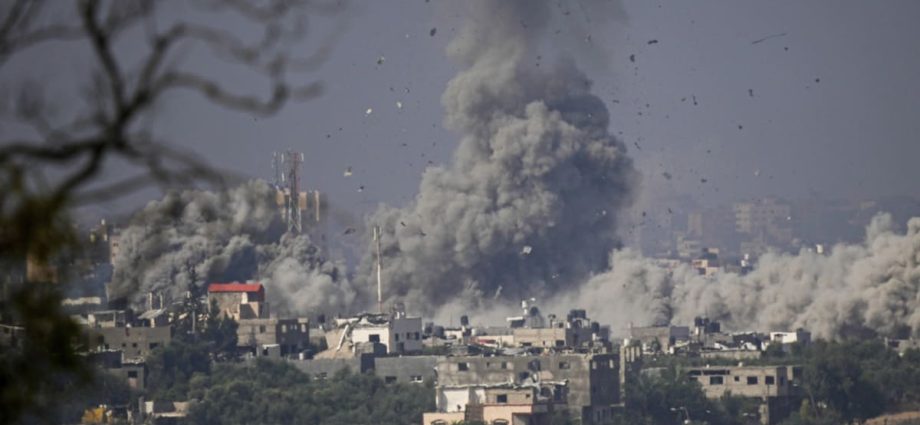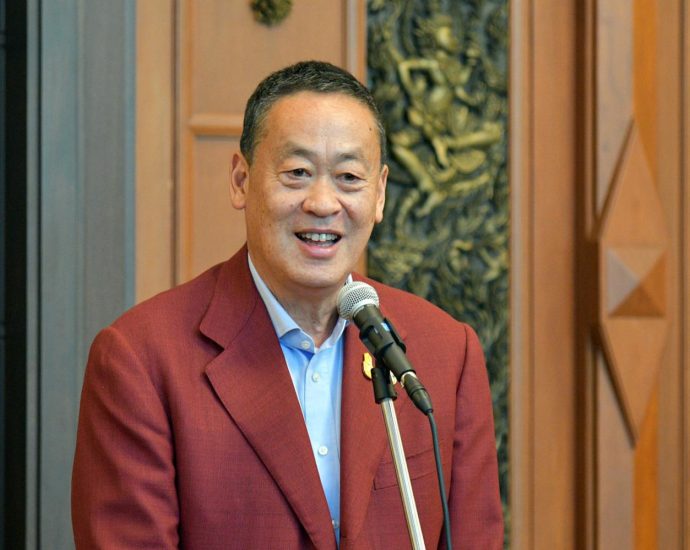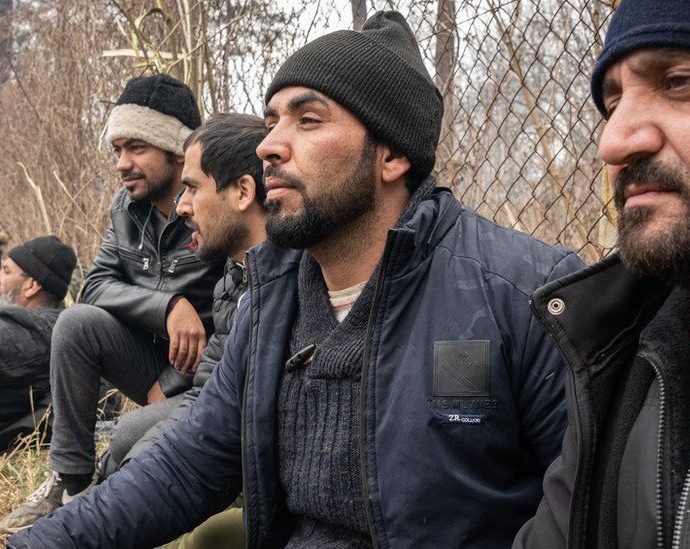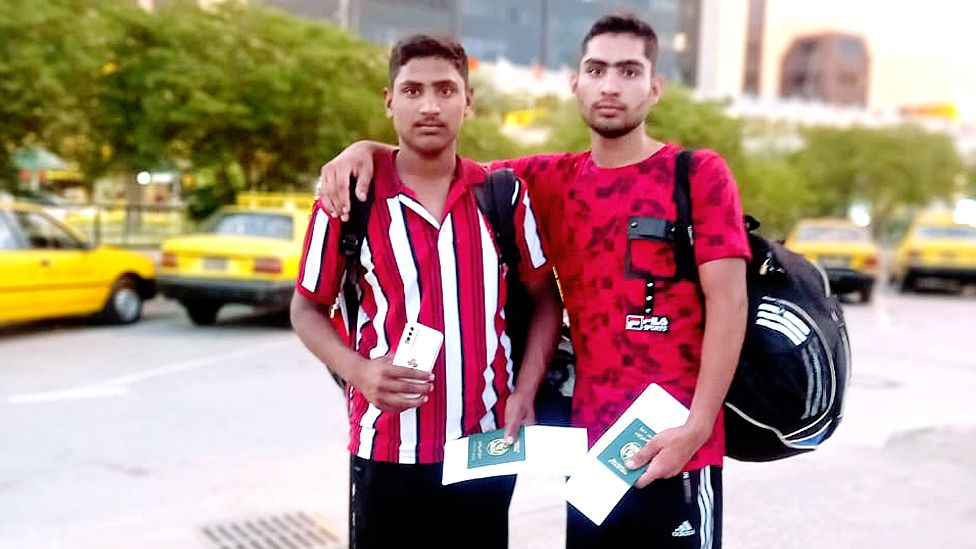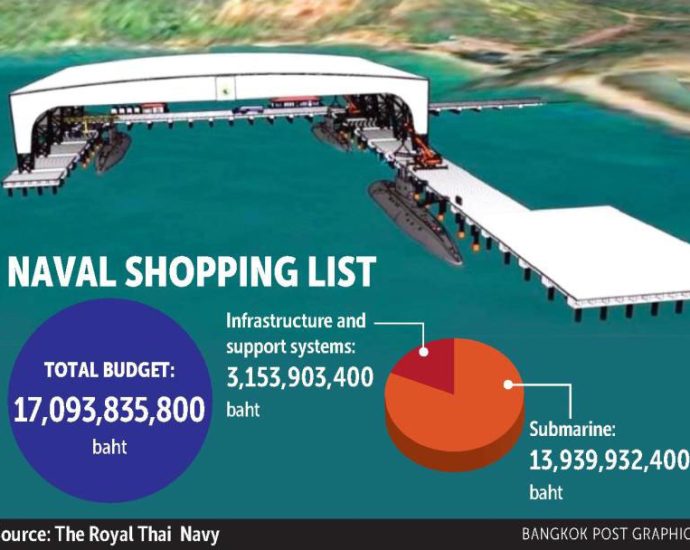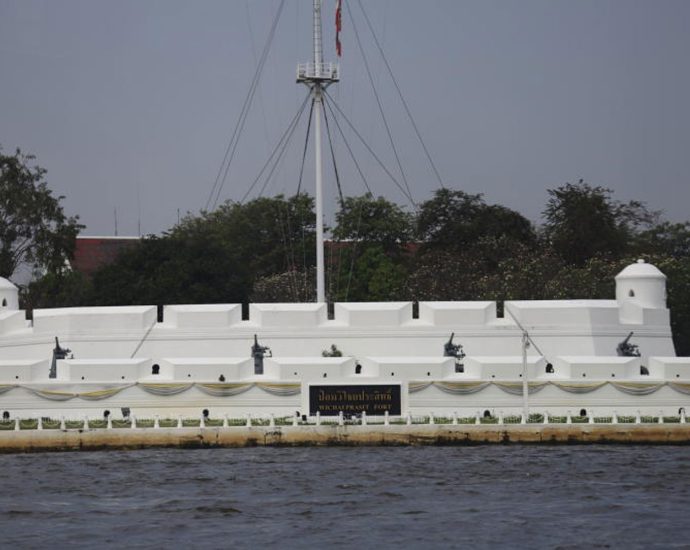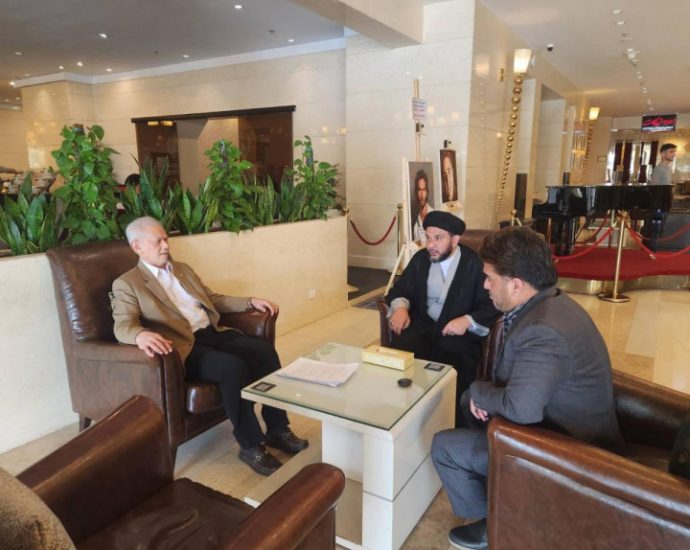Singapore votes in favour of UN resolution to protect civilians, uphold humanitarian obligations in Gaza Strip
The resolution outlined several terms, including recalling existing resolutions to protect civilians in armed conflict. It also expressed “grave concern” over the latest escalation of violence since the attack on Oct 7 and the “grave deterioration” of the situation in the region. The latest resolution condemned “all acts of violenceContinue Reading
Is the halo starting to slip?

For as long as it has been around, the Move Forward Party (MFP) has prided itself as an agent of change, a party known for adamantly resisting the status quo and the obsolete “norms” of the old political machinery.
However, events of the past several weeks have landed it in a pool of indignation for failing to practise what it preaches.
Particularly damning was Pita Limjaroenrat’s unexpected resignation as MFP leader, which critics theorised to be an alleged plot to maximise political leverage for the party looking to have its cake and eat it too.
Since being handed the order by the Constitutional Court suspending him from duty as an MP pending a conclusion to his shareholding case, Mr Pita’s absence from the political scene has been noted.
Meanwhile, the MFP is losing visibility in parliament after refusing to assume the opposition leadership. The reason lay in Mr Pita being put in the political freezer and the MFP continuing to keep its MP, Padipat Santipada, as deputy House speaker.
Spooked that its prominence was under threat, the MFP moved quickly to organise its assembly to elect its new leader and board of executives on Sept 23 to grab the opposition leader seat, which proved useful for the party in finding its feet at the opposition bench.
The move marked an about-face for both the party and Mr Pita, who earlier declared the MFP prioritised the deputy House speaker post over that of the opposition leader. Mr Pita made it quite clear that supporters did not choose the party to see it end up in the opposition wing.
However, a major roadblock stood in the way. The new MFP leader could not occupy the opposition leader post unless and until Mr Padipat stood down as the first deputy House speaker, a position he held since July 5 before the ties between the MFP and the Pheu Thai Party, its once steadfast buddy in the so-called pro-democracy alliance, soured with the latter pulling away to form a government with parties in the previous government.
However, an alleged plan had been conceived that would prove strategically astute for the MFP and the opposition bloc as a whole.
Section 106 of the constitution stipulates that the opposition leader is appointed from the biggest party in that camp. Its MPs must not serve as cabinet ministers or as the House speaker or deputy speaker.
So, with Mr Padipat serving as the first deputy House speaker, the MFP, which commands the largest number of seats at 151, could not legally lead the opposition camp.
To sidestep such a restriction, it was seen that the MFP would have to expel Mr Padipat to enable him to move to another party and keep his deputy House seat while freeing the MFP to have its new leader serve as opposition leader.
The one-MP Fair Party, closely aligned to the MFP, had pledged several times to take Mr Padipat under its wing if he was purged. And purged he was last month. Shortly after that, the Fair Party accepted him into its fold.
Mr Padipat himself admitted his expulsion was one of several options, which some observers agreed has worked to the optimal advantage of the MFP.
Mr Padipat recently explained that his expulsion from the MFP had been mulled over as a tactic to prevent him from losing the deputy House speaker post.
“I can’t expel myself from the MFP. But it’s certainly one of many options being entertained,” he said before he was driven out of the MFP.
Some observers, however, have said taking such an option has ultimately backfired on the MFP, whose reputation could suffer a setback from resorting to trickery to have its way.
The party has championed itself as a breath of fresh air for Thai politics, long dominated by many wheeler-dealers in the cloak of MPs. The party has steadily gained a large following to emerge as the biggest party in the polls thanks largely to its pledge to revolutionise the old system of buoying the status quo by ditching the malpractices and pursuits of hogging power at all costs, regardless of ethical question that may arise.
While it holds true that Mr Padipat is required to belong to another party in order to retain his deputy House seat, which technically cuts him off from the MFP, the observers insisted that in practice, Mr Padipat remains bound ideologically to the MFP.
The expulsion was also nothing but a ploy the MFP engineered to prevent the power of the deputy House speaker post from slipping from its grasp so it could drive its legislative agenda smoothly, according to critics.
Being dealt an image deficit may not bode well for an MFP intent on expanding and eventually scoring a landslide win in the next election, resulting in the party ruling the next government solo.
Critics aghast at PM’s ‘diplomacy’
The safety of Thai workers who are caught in the Israel-Hamas violence is undoubtedly the government’s top priority, considering how resources are being mobilised to facilitate their evacuation, according to political observers.

Padipat: Admits expulsion was a ploy
So, Prime Minister Srettha Thavisin’s display of frustration early this week — upon learning some of them have changed their minds and stayed behind and risked their lives after being offered an increase in pay by their Israeli employers — is understandable.
The generous offer also came amid reports that some Israeli employers had delayed salary payments to Thai workers until Nov 10 in a bid to keep them in the country despite the escalating conflict.
Feeling the situation was not in the best interest of the Thai workers and should be resolved, Mr Srettha said he would turn to the Israeli ambassador, Orna Sagiv, for assistance.
“Money must not be an issue… I have to call the ambassador and ask for cooperation because it is not truly right [for the workers to remain working],” the prime minister was quoted as saying on Monday. “Thai labourers deserve much better care than this.”
The prime minister rang the Israeli ambassador as planned, and he revealed the details of the conversation to the press the following day.
“I said [to the ambassador] bluntly that it’s unacceptable to lure people to stay with money. I don’t think it’s right. The ambassador had no knowledge of such reports and would investigate the matter.
“I also stressed that reports regarding payment delays were true, and I strongly urged them to look into the matter for us,” Mr Srettha was quoted in media reports as saying.
However, while several political observers say they can relate to Mr Srettha’s feeling of frustration as evacuation operations will be harder to arrange if the conflict intensifies, they are left aghast by the way the premier approached the diplomat.
One of those who felt the prime minister’s actions were utterly unacceptable is Olarn Thinbangtieo, a political science lecturer at Burapha University.
In his view, the premier unnecessarily resorted to a confrontational tone, which is considered inappropriate when engaging with a diplomat from a country with which Thailand maintains friendly relations. Mr Srettha should have taken a more gentle approach in requesting the diplomat’s assistance in resolving the matter.
“Maybe it slipped his mind that we have a foreign minister who ought to understand diplomacy better than him,” Mr Olarn said, pointing out that it was not the first time Mr Srettha’s attempt at exercising leadership could spell trouble.
According to the academic, the prime minister was rushed to condemn Hamas when the violence broke out early this month. He was referring to a message posted by Mr Srettha on social media platform X, formerly known as Twitter.
“We strongly condemn this attack, which has tragically resulted in loss of innocent lives and injury to civilians,” read part of his message, which was posted in English on Oct 7.
Foreign Minister Parnpree Bahiddha-Nukara came out to clarify that Thailand’s stance was a neutral one, and the country would not condemn either side but would denounce the use of violence.
Mr Srettha’s action might have been prompted by the need to demonstrate leadership as the former property tycoon is regarded by his critics as the puppet of jailed former prime minister Thaksin Shinawatra, according to the analyst.
“But it’s politically incorrect for him to act in this manner. Mr Srettha might have won the applause of some Thais, but there is a tactful way to approach the matter because Thailand and Israel retain friendly ties.
“This is not to mention that the Thai workforce is happy to work in Israel because they offer high wages and the Thai workers are employed in the jobs locals are reluctant to do,” said the academic.
Mr Olarn’s concern is that the prime minister’s lack of tact does not bode well for the country as it seeks to advance the nation’s interests at the expense of diplomacy.
“We must realise we don’t have authority over them. It’s totally inappropriate to use such a tone with the ambassador,” the academic insisted.
In response to claims about payments to retain the workers, the Israeli embassy issued a statement denying that salary payments were being delayed to get Thai workers to stay.
It noted that the complaints might come from those wishing to receive wages earlier than usual, which are paid on the 10th of each month.
The embassy also said Thai workers played an important role in the agricultural sector and the food supply chain and their visas were extended. and special allowances were approved for those who decided to remain in their jobs near the Gaza Strip until the end of this year.
House panel to review casino plan

PUBLISHED : 28 Oct 2023 at 07:49
The House of Representatives has set up a 60-member committee to study the potential opening of entertainment complexes, including casinos, to address the problem of illegal casinos and boost the country’s economy, as proposed in a motion submitted by MPs from various parties.
Supporters of the motion included Thoedchart Chaipong, a Pheu Thai MP for Chiang Rai; Non Paisanlimcharoenkij, a Move Forward Party MP for Nonthaburi; and Chatchawal Kong-udom, a United Thai Nation Party list-MP.
The motion calling for forming a committee to examine the matter underwent deliberation in a House meeting chaired by House Speaker Wan Muhamad Noor Matha on Thursday.
Rangsiman Rome, a Move Forward Party list-MP, expressed his support but warned that a similar working body was also established by the previous House of Representatives to study this matter.
The opposition MP said he was informed that a company based in Tak province, accused of engaging in human trafficking and the illicit trade of human organs, succeeded in sending a representative to express its views before the committee, seemingly with malicious intent.
Mr Rangsiman emphasised the need for preventive measures against ill-intentioned influence.
The Move Forward MP said he believed legalising casinos in Thailand could lead to the collapse of border-operating casinos, redirecting Thai gamblers’ money towards government revenue for national development.
United Thai Nation Party list-MP Chatchawal highlighted the loss of income due to Thai people travelling to neighbouring countries for casino gambling. Mr Chatchawal said he first proposed the legalisation of casinos 30 years ago, but many disagreed.
At least five entertainment complexes with casinos should be strategically located across the country — one each in the North, the South, the East, the West and the Central Plains, he said. These would provide local jobs, ending the need for some Thais to work abroad, he said.
Chiang Mai airport to be open around the clock from Nov 1

PUBLISHED : 28 Oct 2023 at 07:49
Chiang Mai International Airport will begin operating around the clock from next Wednesday as a response to the government’s Quick-Win economic stimulus policies, said Transport Minister Suriya Jungrungreangkit.
According to Mr Suriya, the expanded working hours, ordered directly by Prime Minister Srettha Thavisin, are seen as necessary given the expectation that tourists will be flooding in during the peak season at the end of the year and in the future due to the visa-free scheme for Chinese and Kazakh visitors, among other factors.
Responding to the policy pushed out by Airports of Thailand (AoT), the airport in this northern province will expand its hours from 6am to 12am to a round-the-clock operation from Nov 1.
A direct flight from Chiang Mai to Osaka in Japan, operated by Thai Vietjet, will be the first to depart once the change is made. It will leave Chiang Mai at 12.30am that day.
Mr Suriya said the ministry had ordered the AoT to discuss how to arrange appropriate flight routes and schedules with carriers and related sectors.
These must follow the airport’s environmental impact assessment (EIA) and have the least impact on residents living near the airport. A suitable compensation plan for those who will be impacted by the expanded operation hours will also be discussed.
The AoT will also hold a public hearing with any residents impacted by the expanded hours later, said Mr Suriya.
Mr Suriya also ordered related sectors to improve their services and facilities to support the province’s tourism and hospitality sectors.
The expanded operating hours aim to unlock the limitation on tourists’ time while travelling in the province while also providing an alternative for carriers when they arrange their flight routes and schedule time slots.
As the airport has already been welcoming 4,800 visitors from 20 international flights a day, the government expects the 24-hour service will cause the number of international passengers to jump by about 30%, said Mr Suriya.
Police nab suspect who aided prisoner’s escape

PUBLISHED : 28 Oct 2023 at 07:49
SONGKHLA: One of five suspects wanted in connection with aiding the escape of 37-year-old prisoner Chaowalit Thongduang, alias “Sia Paeng Nanod”, from Maharat Nakhon Si Thammarat Hospital, has been arrested in Hat Yai district.
Khanet “Boy” Thongprajong, 28, was apprehended inside a shopping mall in Songkhla’s Hat Yai district on Thursday evening as he went to watch a movie. He admitted to the charges during police questioning at Muang station in Nakhon Si Thammarat yesterday.
Khanet was among the five suspects facing arrest warrants for their alleged involvement in aiding the escape of the prisoner — who is incarcerated for a number of serious crimes — from the hospital on the night of Oct 22. Chaowalit had been taken from prison to the hospital for dental treatment that Friday and was subsequently kept in after collapsing, citing severe leg pain.
During questioning yesterday, Khanet initially denied involvement, but he later confessed when presented with CCTV footage from the hospital. He admitted to providing a mobile phone and tools to Chaowalit last Friday night.
Police took him to Maharat Nakhon Si Thammarat Hospital yesterday to reenact the crime. Police also seized his motorcycle at a rented house in Muang district.
According to Khanet’s confession, he had known Chaowalit in Central Nakhon Si Thammarat Prison, where he was serving a sentence for drug charges. Following his release, Chaowalit contacted him.
Khanet now faces charges of colluding in helping a prisoner escape, which carries a prison term of up to five years.
Police suspected Chaowalit may be hiding in Khao Banthat Wildlife Sanctuary, a refuge for animals that covers four southern provinces.
Police were tracing the prisoner in the area via mobile phone signals.
New frigate a challenge for navy

PUBLISHED : 28 Oct 2023 at 07:49
The government’s decision to procure a Chinese-made frigate to replace a submarine the navy ordered in 2017 will pose a significant challenge for the navy, especially given that numerous items have been procured to support the submarine plan.
HTMS Chang, a new amphibious transport dock ship
Commissioned in April, HTMS Chang was to be used to help HTMS Ang Thong until the construction of the 13.9-billion-baht S26T submarine was finished. HTMS Chang, also called a landing platform dock (LPD) ship, was intended to serve as a submarine tender. However, with a displacement of 20,000 tonnes and a seven-figure operating cost, the vessel spends more time docked than at sea.
First phase of a submarine dockyard and support facility at Laem Thian in Chon Buri’s Sattahip district
The first phase of the submarine dockyard and support facility, with a budget of 857.6 million baht, is said to be behind schedule by 200 days and is 50% completed. About 434.8 million has been paid to the contractors. It is expected to be completed in December.
Second phase of a submarine base and support facility at Laem Thian in Chon Buri’s Sattahip district
The second phase, with an estimated budget of 810.2 million baht, is about 50% complete and nine days behind schedule. About 379.7 million baht has been paid. It is expected to be completed in November next year.
Submarine maintenance depot, infrastructure and support system
Estimated to cost 919.7 million baht, the facility is about 40% complete and 280 days behind schedule. It is expected to be completed next April. About 403.1 million baht has been paid.
A testing facility with storage for torpedoes and mines
The facility was completed in July with a budget of 129.3 million baht.
A testing facility with storage for guided missiles
Construction was completed in July with a budget of 136.9 million baht.
Submarine communications, command and control system
A budget of 300 million baht was set aside for systems procurement, and 10.5 million baht was disbursed. It comprises radio comms equipment (70 million baht), to be completed next September, and strategic command and control equipment and system (230 million baht), procurement of which is expected to begin next year.
In summary, the support system for the submarine project is estimated to cost 3.15 billion baht, and about 1.49 billion has been spent.
A 20-man delegation was deployed to Wuhan in China but the officers returned to Thailand when construction of the submarine was suspended.
Some 44 officers have been recruited to be the submarine crew.
Going undercover to reveal people smugglers’ sales tactics
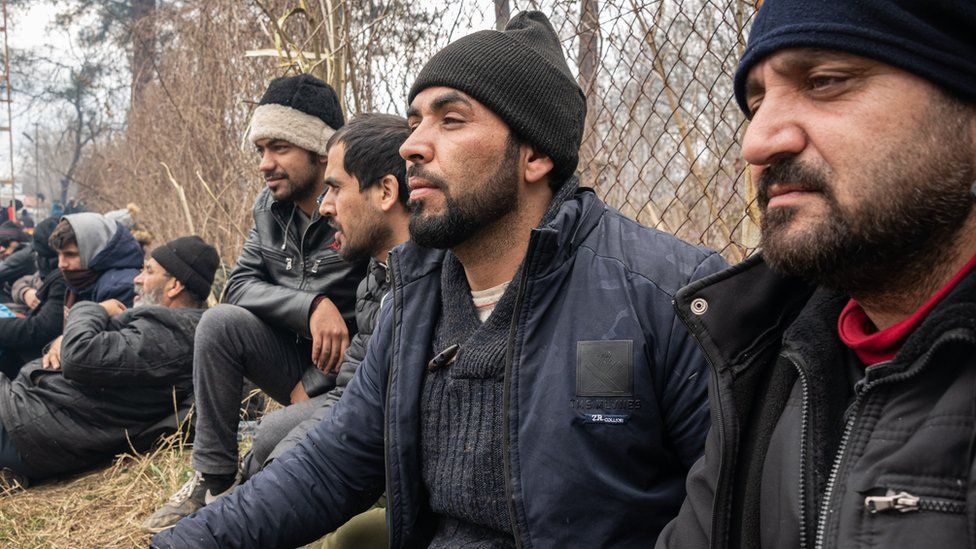 Getty Images
Getty Images“There is nothing to be worried about. Whether they’re 12 or 18 years old, we take guys of these ages too.”
A people smuggler in Quetta, who arranges illegal routes out of Pakistan, is explaining his business model to an undercover BBC journalist. For 2.5m Pakistani rupees ($9000; £7,500), a young man can arrive in Europe “safe and sound” in approximately three weeks, he says, by crossing the border into Iran on foot and then travelling by road via Turkey to Italy. His tone is reassuring.
“He should keep snacks. He should definitely carry good quality shoes, and two or three sets of clothes. That’s it. He can buy water from Quetta. He will call upon reaching Quetta and a guy will come and receive him.”
The smuggler – Azam – claims hundreds of migrants cross the Pakistan border into Iran every day. He downplays the risks to our reporter, who is posing as a man wanting to bring his brother to the UK.
With inflation soaring in the country and the Pakistani rupee plummeting in value, many people are looking to move. Pakistani authorities have told the BBC nearly 13,000 people left Pakistan to go to Libya or Egypt in the first six months of 2023, compared with close to 7,000 in the whole of 2022.
Often the journeys they take are dangerous. In June, hundreds of migrants died after a cramped fishing vessel sank off the coast of Greece. At least 350 Pakistanis were thought to be on board.
“Even if he gets caught [along the way], he is only going to end up back at home. No-one is going to kidnap him and ask for ransom,” Azam says.
But migrants who attempt to travel via Libya can fall prey to militias and criminal gangs. One Pakistani man we spoke to, who used a people smuggler to travel to Italy, says he was kidnapped and imprisoned for three months in Libya.
Saeed (not his real name) says he was only released after his family paid a ransom of $2,500 (£2,000).
This video can not be played
To play this video you need to enable JavaScript in your browser.
‘DM for game’
Many smugglers are operating in plain sight on mainstream social media platforms like Facebook and TikTok – through accounts that have tens of thousands of followers.
Since May, the BBC has been monitoring social media accounts promoting illegal migration routes. We have found that the smugglers’ tactics are concealed by a web of euphemisms that enable them to sidestep content moderation and law enforcement. They arrange trips and payments privately via direct messages and WhatsApp.
Code words like “dunki” and “game” are used to promote illegal routes to Europe. “Dunki” refers to boat crossings and “game” describes the journeys that migrants will take from start to finish.

You can listen to “BBC Trending: Exposing people smugglers” on BBC Sounds.

The three most common routes from Pakistan transit through Turkey, Iran or Libya before reaching their final destination in Europe.
Since the Greek migrant boat disaster, people smugglers we monitored have been increasingly promoting “taxi games” – shorthand for routes by road through Eastern Europe – as the favoured smuggling method.
Smugglers’ social media accounts post videos of groups of migrants hiding in woods and running into minivans, with agents’ names and mobile phone numbers superimposed on top. On WhatsApp, customers and “agents” exchange messages about the next “game” in group chats with hundreds of members.
Azam specialises in “taxi games”, claiming they are safer than sea routes. But there are risks to those land routes too.
The UNHCR – the UN’s refugee agency – says freezing temperatures in winter as migrants attempt to cross borders on foot, as well as road accidents, have resulted in deaths.
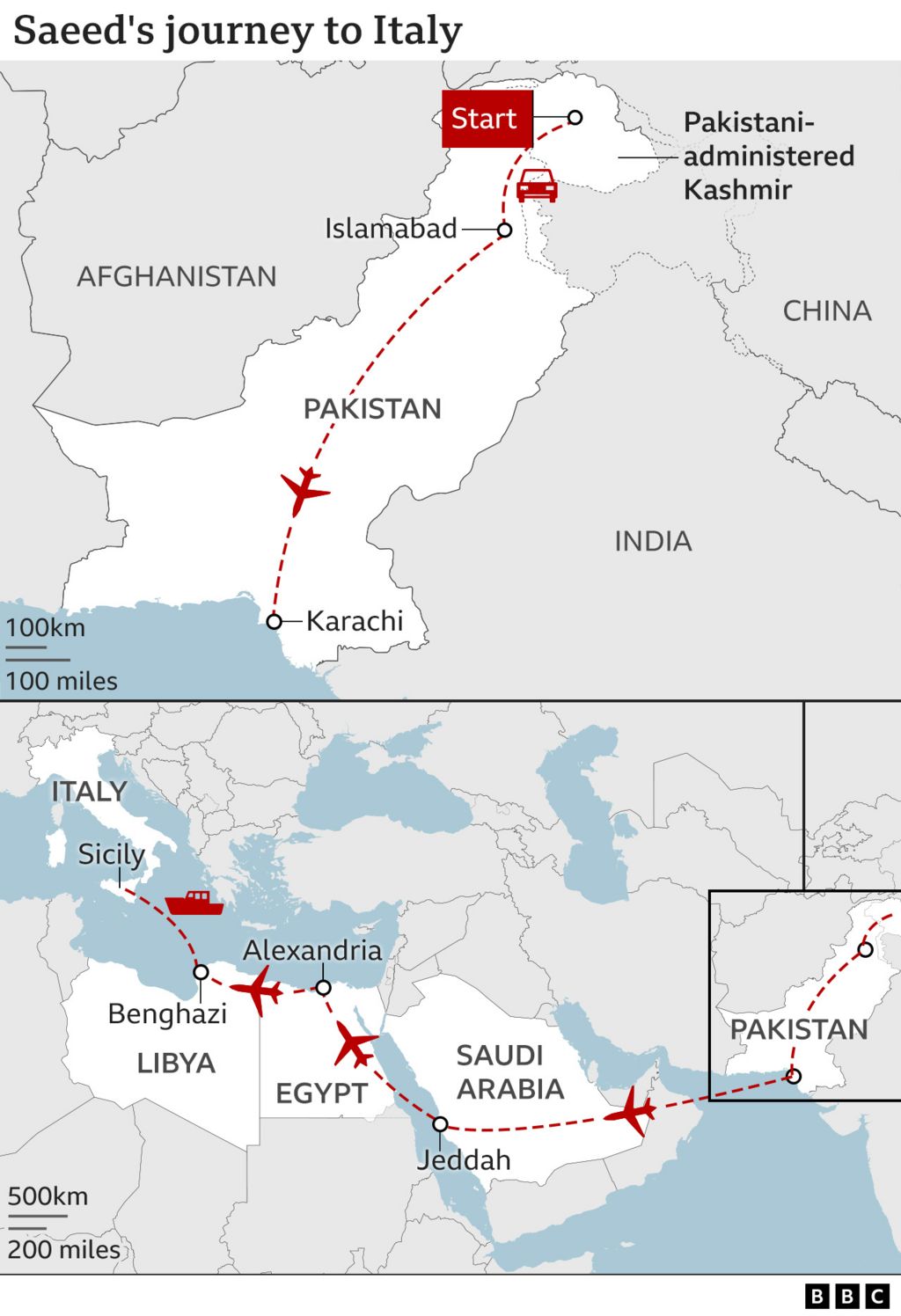

Five other smugglers we spoke to also recommended “taxi routes”. One said he could get someone to the UK from France for £1,000 ($1,228).
We put our evidence to Meta, which owns Facebook and WhatsApp, and TikTok – that their platforms are being used to promote illegal people smuggling.
Meta took down all links to the Facebook groups and pages we flagged to them, but did not take down the profiles attached to them. It did not remove WhatsApp groups, because its policy of end-to-end encryption protects privacy and does not allow for moderation.
TikTok took down the links to the accounts we alerted them to. It says the company “has zero tolerance for content that facilitates human smuggling” and “removed accounts and content that violate their policies”.
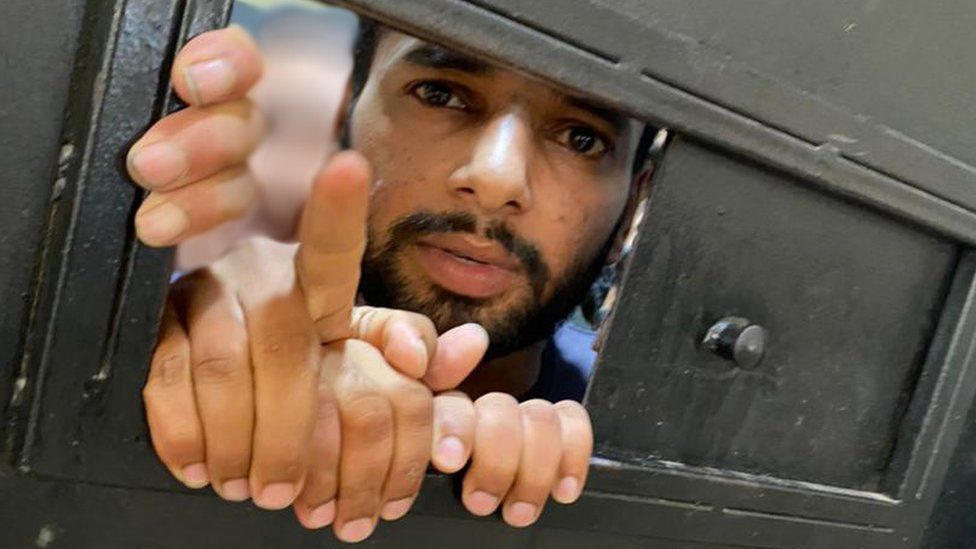
‘Journey of death’
Saeed left his town in Pakistani-administered Kashmir almost a year ago because of a lack of employment opportunities for young men in his area – and clashes along the border with Indian-administered Kashmir. He lived very close to the Line of Control – the de facto border between India and Pakistan in the contested region – but has been in Italy for 10 months.
He says he was influenced to come to Europe by a combination of TikTok videos he saw online and by a friend who had left Pakistan a few months before him.
“I heard that it’s very simple to come here and it would take about 15-20 days. But it was all a lie. It took me more than seven months,” he says.
Saeed is awaiting the outcome of his asylum claim in Italy and says he now regrets taking the illegal route, calling it “a journey of death”. But he regularly posts videos on TikTok of his new life in Italy.
A few clips document his route from Pakistan, mostly showing an excited young man on his journey. These upbeat videos follow a TikTok trend which many young Pakistani men like him, who arrive in Europe, have participated in.
In one video captioned “Pakistan to Libya”, a friend he travelled with films them both, selfie-style, sitting on a plane, smiling.
He says that it’s “just a form of art” to post videos like this and argues they are “not a true reflection of society”.
Two weeks after our undercover journalist first contacts the smuggler, we call him again – this time revealing we are BBC journalists.
When we challenge Azam about the dangers of the illegal routes he is promoting, he hangs up.
Related Topics
-
-
20 February 2021

-
Gentle prod ends submarine dream
Govt fingerprints all over navy’s axing of deal with manufacturer in China, writes Wassana Nanuam
PUBLISHED : 28 Oct 2023 at 06:22
NEWSPAPER SECTION: News

The Pheu Thai-led government’s decision to acquire a Chinese-made frigate instead of a submarine in the wake of problems and delays with the original purchase came as no surprise following Pheu Thai’s intense scrutiny of the scheme.
The submarine deal remained in limbo for months after it was revealed that China had failed to procure a German-made MTU 396 engine for the submarine on order and offered the Chinese-made CHD620 engine instead.
According to the original agreement signed in 2017, Thailand was to use the German-made engine in an S26T Yuan-class Chinese submarine it ordered from China. However, Germany now forbids engines made domestically from being used in Chinese military hardware, so China proposed that a Chinese-made engine be used in the submarine.
After several rounds of negotiations and assurances that the Chinese engine would be up to the task, former navy chief Adm Choengchai Chomchoengpaet said before his retirement, the navy was prepared to recommend the Chinese-made engine.
As it turned out, the government decided not to proceed with the submarine procurement and proposed to buy a Chinese-made frigate as an alternative.
Considering Pheu Thai’s criticism of the purchase when it was in opposition, it was foreseeable that the project would not see the light of day upon coming to power.
“There has been no order from the government or the Pheu Thai Party. It is a solution worked out by the Defence Ministry and the navy,” Defence Minister Sutin Klungsang said.
However, a naval source said the frigate proposal was drawn up following the meeting between Mr Sutin and the navy. To avoid being associated directly with the party, Mr Sutin reportedly instructed the navy to explore alternatives if the submarine deal could not go ahead, the navy source said, which was confirmed by a source in the Defence Ministry.

According to the naval source, the navy, therefore, came up with two proposals — one was to buy a Type 054A Jiangkai II frigate, and the other was to purchase a Corvette Type 056 Jiangdao offshore patrol vessel (OPV).
However, the navy already has seven frigates in its fleet, with the Prayut Chan-o-cha cabinet approving its plan to acquire a new one with an estimated cost of 17 billion baht in the 2024 fiscal year.
While the new frigate project is not yet finalised, South Korea is said to be high on the tentative list of suppliers. The navy’s seventh frigate — HTMS Bhumibol Adulyadej — was built by South Korea under a budget of 14.9 billion baht and commissioned in January 2019.
According to the source, the submarine is essential to the navy’s strategic and defence capabilities plan, although the number is reduced to one from originally three. China is obliged to take responsibility and compensation for its failure to fulfil the contractual requirement.
The navy had held talks with China Shipbuilding & Offshore International Co (CSOC), which is contracted to build the submarine under a government-to-government agreement, but the firm could offer only free spare parts for eight years and free training.
If the government agreed with the change from the German-made engine to the Chinese-made engine, it would have been expected to lobby China to hand over two second-hand submarines to Thailand for training as it awaited the purchased submarine’s completion and delivery in about three years.
“CSOC never responded to the second-hand submarine request, so that issue would have needed to be handled by the government. The second-hand submarines are part of the Chinese navy fleet, not owned by the firm,” said the naval source.
It is possible that the Pheu Thai-led government will consider a new submarine acquisition scheme after Mr Sutin expressed his interest in a German-made submarine under a barter trade agreement, the source said.
Mr Sutin’s decisive role in scrapping the Chinese-made submarine deal has several political analysts reassessing the defence minister and his role in military affairs, particularly military reforms.
The S26T Yuan-class submarine was originally due to be delivered to Thailand this year, but the pandemic had postponed its delivery to next April.
BMA, navy to liaise on river walkway
PUBLISHED : 28 Oct 2023 at 06:05

The Bangkok Metropolitan Administration (BMA) and the Royal Thai Navy (RTN) have set up a joint committee to supervise a walkway project to link tourist attractions along the Chao Phraya River on the Thon Buri side.
Bangkok governor Chadchart Sittipunt said that BMA plans to build a riverfront walkway connecting Wat Kalayanamit Woramahawihan to Wichai Prasit Fort, located in an RTN compound.
After a meeting with the RTN chief Adm Adung Phan-iam, the governor said the two parties will discuss walkway construction next week.
Besides the old fort, the RTN also houses another historical attraction, the Thon Buri Palace of King Taksin the Great.
The RTN understand the need for the project as it will facilitate tourists, but RTN also need to preserve their office zone from outsiders, said Mr Chadchart.
The Fine Arts Department will also join the talk as the walkway construction will occur along the historical sites.
The governor said the walkway project would start from Wat Kalayanamit Woramahawihan and cross the Bangkok Yai Canal to Wichai Prasit Fort. After that, tourists can walk along the Arun Amarin Road to other touristy spots, including Wat Arun and Wang Lang Market.
In addition, tourists can walk from Wat Kalayanamit to the Phra Pokklao Sky Park.
Mr Chadchart said the walkway design is set to be completed by the end of this year.
He also said the BMA plans to build a promenade along the Klong San to connect the Santa Cruz Church, the Princess Mother Memorial Park and Tha Din Daeng Road in Klong San district.
The BMA has already improved the landscape in the Kudi Chin community where the Santa Cruz Church is located by renovating an existing walkway, installing street lamps and planting gardens.
‘Hamas ready to free all Thais’
Wan’s hostage talks a success, Iran rep says

Recent negotiations with Iran have gone smoothly, with the Palestinian militant group Hamas poised to release all Thai hostages immediately, according to Saiyid Sulaiman Husaini, leader of an association of Shia Muslims in Thailand.
Mr Husaini provided an update on Friday on the progress of the negotiations, saying the team formed by House Speaker Wan Muhamad Noor Matha arrived in Tehran and launched into talks with Hamas at 10am local time on Friday.
The team is being led by former Narathiwat MP Areepen Uttarasin and Lerpong Syed, Mr Husaini’s brother.
The majority of Iranians are Shia Muslims, whereas most Palestinians and Hamas militants are Sunnis.
Iran is believed to be supporting Hamas with funds, weapons and training in its ongoing war with Israel.
Mr Husaini reportedly has a strong reputation and wields considerable influence among Shia Muslims both in Thailand and in neighbouring countries.
“(Friday) morning, the negotiations went smoothly. But details cannot be disclosed until the negotiation is concluded,” Mr Husaini wrote.
“Hamas has given a signal to Thai representatives that it will release Thai hostages immediately when the situation is safe as they claimed that Israel is attacking all sides of the Gaza Strip (in a bid to) to sacrifice foreign hostages to discredit Hamas.”
Khampee Disthakorn, a spokesman for the House speaker, said Mr Wan was negotiating with parties on all sides of the Israel-Hamas conflict, regardless of their religion, to help release all of the Thai hostages.
His scheduled visit to Saudi Arabia next Friday has now been postponed, however, after the Saudi government said it is not ready to welcome guests amid the ongoing war.
Separately, Prime Minister Srettha Thavisin refuted a report on Friday claiming that 54 Thai nationals are among the 220 hostages being held in the Gaza Strip.
“I have checked and verified the situation with our Thai ambassador in Israel, as well as with security agencies, and they confirm that 18 Thais are being held. The number 54 may be the result of some sort of confusion,” he said.
Reuters quoted the Israeli government mid-week as saying the number was 54.
Mr Srettha also referred to the issue of Thai workers whose salaries have not been paid and who wish to return home.
He said he had spoken to Orna Sagiv, Israel’s ambassador to Thailand, and the salaries will be paid as soon as they leave the country.
Meanwhile, Foreign Ministry spokesperson Kanchana Patarachoke said the current Thai death toll from the conflict stands at 33, with 18 others injured and the same number held hostage.
So far, the remains of 15 Thais have been returned to the kingdom, she said, adding that 4,771 Thais have returned to Thailand on 23 government-sponsored flights.
At least 40 Thais who enrolled to study at the Arava International Centre for Agriculture Training in Israel have returned to Thailand, while 75 others wish to remain in the country, she said.
She advised those who are staying there to make safety their top priority, recommending they return home first and reconsider their options.
Labour Minister Phiphat Ratchakitprakarn said the ministry would not send Thai workers to resume their jobs in Israel until the war has ended.
Mr Phiphat urged Thai workers to enjoy some rest with their families in their home provinces while the Employment Department negotiates with Israel on how to allow them to resume working there once the situation returns to normal.
Israel has decided to extend for another year the work permits of those whose contracts have ended, Mr Phiphat said.
The ministry is also in talks with South Korea and other countries in Europe, as well as Australia, to see if they have demand for Thai workers with expertise in agriculture, he said.
Some countries have already informed Thailand that they wish to recruit Thai workers for fruit picking or farm jobs, he added.
Mr Phiphat said the ministry will compensate Thai returnees from Israel to the tune of 15,000 baht each. It will seek a bigger budget from the cabinet next week, he added.

